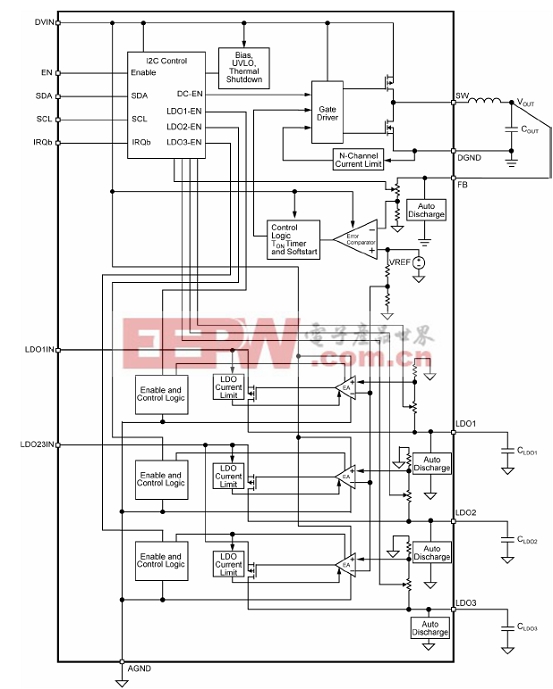基于MIC2826設(shè)計(jì)的四輸出可編電源管理方案
The Micrel MIC2826 is a four output, programmable Power Management IC, optimized for high efficiency power support in Mobile Application Processors, Co-Processors, DSPs, GPS and Media Player chipsets. The device integrates a single 500mA PWM/PFM synchronous buck (step-down) regulator with three Low Dropout Regulators and a 400kHz I²C interface that provides programmable Dynamic Voltage Scaling (DVS), Power Sequencing, and individual output Enable/Disable controls allowing the user to optimally control all four outputs.
The 4MHz synchronous buck regulator features a patented HyperLight Load (HLL) architecture which minimizes switching losses and provides low quiescent current operation for high efficiency at light loads. Additional benefits of this proprietary architecture are low output ripple voltage and fast transient response throughout the entire load range with the use of small output capacitors, reducing the overall system size.
Three high performance LDOs are integrated into the MIC2826 to provide additional system voltages for I/O, memory and other analog functions. Each LDO is capable of sourcing 150mA output current with high PSRR and low output noise. A 2% output voltage accuracy, low dropout voltage (150mV @ 150mA), and low ground current of 116μA (all three LDOs operating) makes this device ideally suited for mobile applications.
The MIC2826 is available in a tiny 14-pin 2.5mm x 2.5mm Thin MLF® with a junction operating range from -40℃ to +125℃.
MIC2826主要特性:
Fast-mode I2C control interface
Tiny 14-pin 2.5mm x 2.5mm MLF® package
Default start-up voltage states and sequencing
Fault indication processor flag C IRQb
-40℃ to 125℃ junction temperature range
Thermal shutdown and current-limit protection
Power On After Fault (POAF) function
DC-DC Synchronous Buck
2.7V to 5.5V input voltage range
500mA continuous output current
HyperLight Load mode
C 25μA quiescent current
90% peak efficiency; 85% at 1mA
Ultra-fast transient response
Dynamic Voltage Scaling (DVS) range: 0.8V to 1.8V
C 0.8V to 1.2V in 25mV steps
C 1.2V to 1.8V in 50mV steps
±2% initial accuracy
Low output voltage ripple: 20mVpp in HyperLight
Load mode, 3mV in full PWM mode
LDOs
1.8V to VDVIN input voltage range
150mA output current (each LDO)
Dynamic Voltage Scaling (each LDO)
C DVS range: 0.8V to 3.3V in 50mV steps
±2% initial accuracy
Low quiescent current C 50μA (each LDO)
Low dropout voltage C 50mV @ 50mA
Low output noise - 45μVRMS
Stable with ceramic output capacitors
65dB PSRR at 1kHz
MIC2826應(yīng)用:
Application processors
GPS subsystems
General purpose PMIC
Mobile phones / PDAs
Portable media players
Mobile television receivers








評(píng)論